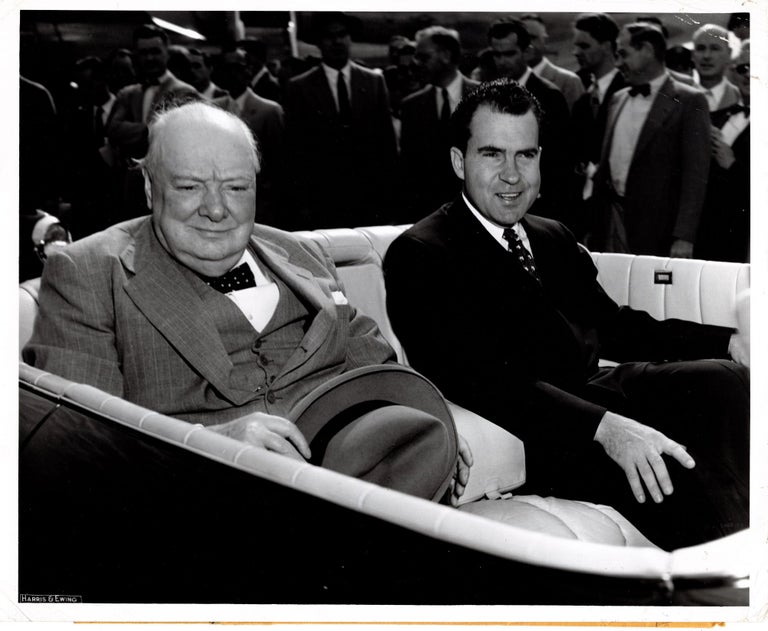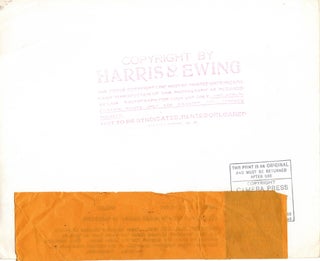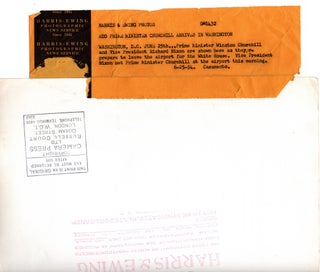An original press photograph of Prime Minister Sir Winston Churchill on 25 June 1954 being greeted by U.S. Vice President Richard Nixon upon arrival at Washington Airport for Churchill's final visit to the White House as Prime Minister
Washington, D.C. Copyright Harris & Ewing Photographic News Service, 1954. Photograph. This original press photograph captures Prime Minister Sir Winston Churchill on 25 June 1954 being greeted by U.S. Vice President Richard Nixon upon arrival at Washington Airport for Churchill's final visit to the White House as Prime Minister.
The image, measuring 10 x 8.125 in (25.4 x 20.6 cm), is a gelatin silver print on glossy photo paper. Condition is very good plus. The image remains crisp and bright. We note just light wear to extremities and light scuffs and imperfections are visible only under raking light. The lower left corner features the imprint “Harris & Ewing” Photographic News Service. The verso features the large copyright ink stamp of “Harris & Ewing” as well as a further copyright ink stamp of “Camera Press Ltd.” specifying that “This print is an original and must be returned after use” to their London address. The verso also retains the original, printed Harris & Ewing caption titled “Prime Minister arrives in Washington” and reading “WASHINGTON, D.C. JUNE 25th… Prime Minister Winston Churchill and Vice President Richard Nixon are shown here as they prepare to leave the airport for the White House. Vice President Nixon met Prime Minister Churchill at the airport this morning. 6-25-54.” This photograph is housed in a removable, archival mylar sleeve within a rigid, crimson cloth folder.
This journey to America was the third and last of Churchill's second, peace-time premiership (1951-55). Images capturing the two men are unusual; this image and the visibly youthful Nixon portrayed testifies to their comparatively brief crossing on the world stage. Nixon would not become president until January 1969, four years after Churchill’s death. Nixon, like most of the world, respected Churchill. Preparing to address the Canadian Parliament, on 12 April 1972 then-President Nixon wrote extensively about Churchill in a three-page memo to his top aides (Price, Haldeman, Erlichman, Kissinger): “The speeches I make are to the great credit of the speech writing team generally highly literate, highly responsible and almost invariably dull… I don’t mean to suggest that I should write or sound like Churchill. He is one of those rare birds where God broke the mold when he died. On the other hand, we can at least learn from him…”
Perhaps one might infer a lack of reciprocal enthusiastic regard from the less exuberant and attentive expression on Churchill’s face. Then again, the weight of serious issues more than justified Churchill’s countenance.
Just days before, on 16 June, Churchill and his Defence Ministers agreed to production of a British hydrogen bomb. "This decision was so secret that it was not communicated to the Cabinet. It formed, however, the basis of Churchill's preparations for Washington..." (Gilbert, VIII, p.993) Days before the conference, Churchill communicated to Eisenhower goals for their conference. Significantly, prominent among the issues was Churchill's assertion that "In no foreseeable circumstances, except possibly a local rescue, could British troops be used in Indo-China, and if we were asked our opinion we should advise against United States local intervention except for rescue." ('Top Secret' Message from the Prime Minister received 21 June 1954)
It is also noteworthy that in the days leading up to the Washington visit, Churchill and Eden disagreed over whether Churchill should consult Washington on the terms of the proposed British withdrawal from Egypt. Churchill wanted to delay negotiations with Egypt until he had explored "the extent to which the United States could be persuaded to support us... or even to be associated with us..." Eden opposed Churchill's suggestion. Significantly, America's opposition to British occupation of Suez would bring down Eden's own government two and a half years later, in January 1957.
More generally, Churchill’s purpose included promoting the idea of a summit including U.S. and Soviet leadership and, as Churchill’s private secretary put it, “an occasion for clearing the air and creating good feeling.” (Colville, Fringes, p.691) Churchill was thwarted by Dulles; the long-sought summit did not take place until after Churchill had relinquished his premiership to Eden.
Having traveled via a Stratocruiser, Churchill reached Washington on the morning of Friday, 25 June 1954 “where he spoke a few words to the American people, the microphones having been set up for him.” As his notes testify, the tone was quintessential Churchill, emphasizing the bond he wished to maintain and secure and focusing on the common threats and challenges: “I have had a very comfortable journey from my Fatherland to my Mother’s Land. I have come with Anthony Eden to talk over a few family matters and try to make sure there are no misunderstandings… and do a lot to help our neighbours… on both sides of the Iron Curtain…”
Churchill left Washington by air for Ottawa on the afternoon of 29 June. When he next returned to Eisenhower’s White House as a guest, it would be a social visit. Of note, "Sir" had just been officially appended to Winston's name when he became a Knight of the Garter on 14 June 1954; he had finally accepted the offer of knighthood from Queen Elizabeth II that had been originally proffered to him during the Second World War by her father, King George VI. Item #006104
Price: $550.00



